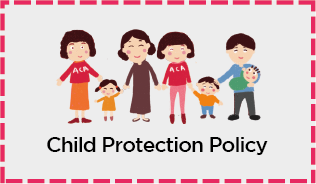Child Protection Policy
Against Child Abuse | Child Protection Policy
INTRODUCTION
The Against Child Abuse’s mission is to promote a caring and non-violent environment for the optimal growth and development of our children. The United Nations Convention on the Rights of the Child stipulates that all children have the right to protection from all forms of abuse, neglect, exploitation and sexual abuse. Protecting children is everyone’s shared responsibility. Schools and organisations engaged in child related work need to develop their internal policies, code of conduct and procedures to ensure that the provision of services takes children’s safety and interests as the first priority. Our Child Protection Institute has assisted schools and organisations to set up child protection policy and provided staff
training to comply with the implementation of the policy to ensure that children and people who come into contact with them are protected.
CODE OF CONDUCT
The Against Child Abuse will take the following action in the event of suspected maltreatment of children:
- respect the dignity, safety and interests of children
- investigate any suspicious incidents and accusations as quickly as possible
- collaborate with all involved parties, provide transparent and factual reports, and initiate support mechanisms
To respect the rights of the child, staff members and volunteers in contact with children are obliged to:
- understand children within the local context in which they live
- work with children in a spirit of co-operation based on mutual trust and respect
- enhance children’s capabilities and develop their potential
- recognize children as individuals in their own right and needs, and value their views
Staff members and volunteers who come into contact with children:
CONFIDENTIALITY
Ensure that confidentiality is maintained for all concerned
Organization-specific Child Protection Policy: we aim to assist organizations to develop policies according to their needs and circumstances
(Updated in April 2020)
Click to read our >>Child Protection Policy<<

| should always | should never |
|
|
PROCEDURES
Overriding Principles
- In all cases the safety and welfare of the child will always be the priority
- The procedures are built on the principle of minimising the need for the child to have to repeat to multiple parties the information unnecessarily
Receiving Evidence of Possible Abuse
- Possible abuse may be disclosed in various ways
- If children indicate that they are being abused, staff members should:
| Respond | Record | Report |
|
|
|
CONFIDENTIALITY
Ensure that confidentiality is maintained for all concerned
Information will be handled and disseminated on a need to know basis only in order to:
- protect a child
- facilitate enquiries
- manage disciplinary/complaint aspects
- protect the rights of the alleged perpetrator
The communication network includes the following persons:
- The child and the parents
- The person being complained against
- The person making the allegation
- Social services units/police
- Agency management
All information will be properly stored with limited access to designated persons, on a need to know basis and in line with data protection laws.
EMPLOYMENT
- Prospective employees seeking child related work are required to undergo a Sexual Conviction Record Check
- All employees are required to undertake relevant child protection training provided by the Agency to ensure their practices in line with code of conduct
Organization-specific Child Protection Policy: we aim to assist organizations to develop policies according to their needs and circumstances
(Updated in April 2020)




 Child Protection Institute
Child Protection Institute



